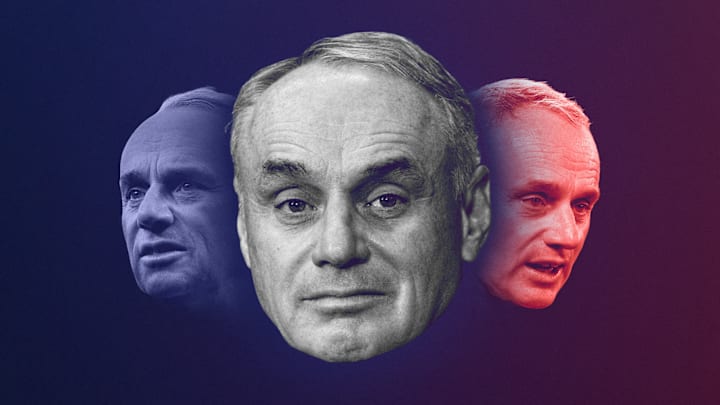Welcome to State of the Union, a weekly column covering the commissioner's office, the players' union and all the forces shaping the future of our national pastime.
Rob Manfred kicked up quite the stir during his appearance in the broadcast booth at the Little League Classic, when he casually mentioned that MLB was once again looking into expansion — and that said expansion could also result in drastic realignment in the name of geographic convenience.
Rob Manfred says future expansion would provide an “opportunity to geographically realign”pic.twitter.com/RXAvmLFTf5
— Talkin’ Baseball (@TalkinBaseball_) August 18, 2025
It's been nearly three decades since the most recent round of expansion welcomed the (then-Devil) Rays and Diamondbacks back in 1998. But this version of the idea, coupled with a fundamentally reordering of institutions that date back over a century, immediately got everyone talking. It was brilliant; it was pure evil; it would ruin some of the game's great rivalries; it would create new divisions that fans couldn't help but watch.
All of which are discussions well worth having. Baseball has been flirting with the idea of expanding to 32 teams for most of the 21st century, and Manfred himself has been fixated on it from more or less the moment he became commissioner over a decade ago. This is likely coming sooner or later, and it will bring with it seismic changes.
But there's a reason that Manfred decided to drop this bomb when and in the manner in which he did. In reality, MLB's consideration of expansion has become just one more weapon in the arsenal as baseball stares down a labor war in just a year's time, one that Manfred hopes will help extract some crucial concessions from the players' union.
For more news and rumors, check out MLB Insider Robert Murray’s work on The Baseball Insiders podcast, subscribe to The Moonshot, our weekly MLB newsletter, and join the discord to get the inside scoop during the MLB season.
What Rob Manfred's really talking about when he talks about MLB realignment
Everything that Manfred publicly says or does right now should be viewed through the lens of December 2026, when the league's collective bargaining agreement is set to expire. The league office and the MLBPA don't seem to have started seriously negotiating yet, and right now it sure seems like we're headed toward a lockout: The increasing disparity between baseball's haves and have-nots has many of Manfred's owners crying foul and demanding major changes to the economics of the sport that the union will go to the mat to prevent.
The most significant of those changes: a salary cap. A growing number of MLB owners are demanding one, insisting that it's the only way they could possibly hope to compete with the likes of the Los Angeles Dodgers and New York Yankees. (Of course, what those same owners always fail to mention is that salary caps also usually come with salary floors that they'll no doubt complain about having to comply with.) The union, meanwhile, understandably views it as a third rail. And so we're at an impasse, with both sides dug in and not a lot of compromise in sight — unless, that is, Manfred can get creative.
To get something you've got to give something, and that's where this recent round of expansion and realignment talk comes in. The MLBPA, of course, would be all for expansion: That's 50+ new jobs, as well as more money going into the pot. And the union has also repeatedly made clear that travel convenience is one of its membership's top priorities; players would no doubt love to cut down on cross-country flights. "Give us a salary cap," Manfred appears to be saying, "and we promise to make it worth your while."
It's unclear whether this will actually work. Players have treated even the suggestion of a salary cap with open hostility for decades, and no one will want to be the one who failed to hold the line. But this is just the beginning of more than a year's worth of negotiating that we've got ahead of us, and it's of course no coincidence that Manfred worked his way up in the league office as a labor lawyer. He knows what he's doing here, and nothing he says or does is without a purpose.
